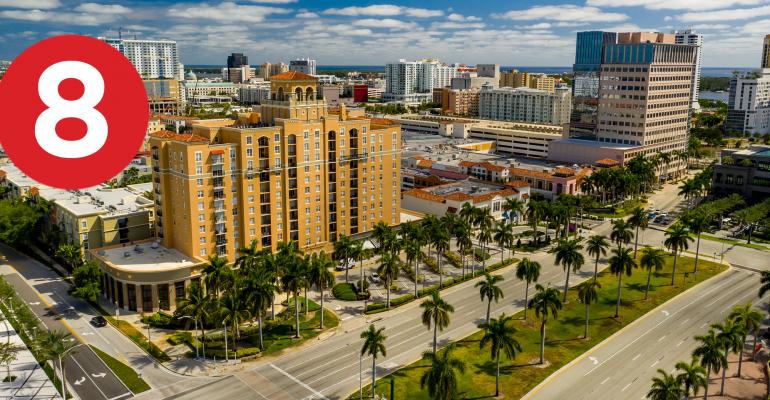- Land Rush Is On in Four States That Approved Recreational Marijuana Last Year “Voters in four states last year approved the recreational use of marijuana. That is likely to launch a land rush there for warehouses and retail properties. Similar measures in other states have sparked heated competition for these types of real estate. Owners have been able to charge as much as three times market rates when selling or renting to businesses involved in the cultivation, distribution, processing or sale of cannabis, according to brokers, landlords and cannabis industry executives.” (Wall Street Journal)
- Retailers Trade Fifth Ave. for Worth Ave. as Palm Beach Scene Thrives with Americans Heading South “Retailers, restaurants and other business owners want to be where the people are. And people are moving to South Florida in droves. Some are taking a temporary retreat during the Covid pandemic, away from the cold weather up North. Others are making a longer-term change, and businesses are following by committing to decadeslong leases.” (CNBC)
- Marriott CEO Arne Sorenson Dies After a Battle with Cancer “Arne Sorenson, 62, president and CEO of Marriott, the world's largest hotel chain, died Monday, the hotel giant announced Tuesday morning. The company shared in 2019 that Sorenson had been diagnosed with pancreatic cancer. Earlier this month, Marriott said Sorenson would be taking a step back from his regular schedule in order to ‘facilitate more demanding treatment for pancreatic cancer.’” (NBC News)
- Builders Say Lumber Prices Are Slowing Economic Recovery “Lumber price spikes are not only sidelining buyers during a period of high demand, they are causing many sales to fall through and forcing builders to put projects on hold at a time when home inventories are already at a record low.” (LBM Journal)
- Foreign Investors Load Up on U.S. Warehouses “Foreign property investors, long drawn to Manhattan skyscrapers, coastal resorts or urban shopping corridors, are increasingly directing their attention to suburban warehouses. The changing attitudes are the latest sign of how the Covid-19 pandemic is shaking up the U.S. real-estate market, leading both domestic and overseas investors to rethink their priorities.” (Wall Street Journal)
- Chase Doubles Housing Grant Program as American Banks Reckon with Low Minority Homeownership “The early days of Guadalupe Mora’s search for a new home were exhausting. A health-care technician at a Department of Veterans Affairs hospital, Mora slowly saved up more than $15,000 to move out of her two-bedroom mobile home and into a new place she picked out with her real estate agent.” (CNBC)
- To Plug a Pension Gap, This City Rented its Streets. To Itself. “The City of Tucson, Ariz., decided last year to pay rent on five golf courses and a zoo — to itself. In California, West Covina agreed to pay rent on its own streets. And in Flagstaff, Ariz., a new lease agreement covers libraries, fire stations and even City Hall. They are risky financial arrangements born of desperation, adopted to fulfill ballooning pension payments that the cities can no longer afford.” (The New York Times)
- Can Industrial Growth in the Inland Empire Continue? “Due to limited land availability, however, it is increasingly more challenging to fulfill the need for industrial space in the region. DAUM Commercial Executive Vice Presidents Gus Andros and Andrew Lara discuss whether the Inland Empire has room for more growth and how the increased demand is reshaping market fundamentals.” (Commercial Property Executive)
0 comments
Hide comments





